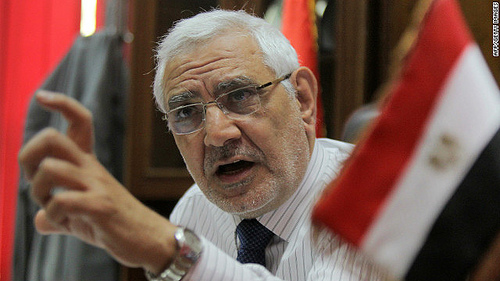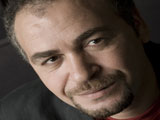Exiled from the “Bastardly” Brotherhood
by Hamdy El-Gazzar and translated by Nour Abdelghani / June 27, 2013 / No comments
New perspectives on the Muslim Brotherhood in light of Egypt’s changing politics.

Former Independent presidential candidate and former Muslim Brotherhood Society leader Abdel Moneim Aboul Fotouh. Photo: safwat sayed via Flickr.
Throughout the history of the Muslim Brotherhood Society, many have broken away and left. We know nothing about some of these men, while others have written and published accounts of their experiences. Some have become proponents of the doodle “the bastardly brotherhood” and at the end consider this organization “blasphemous and Masonic.” Others continue to believe in the Muslim Brotherhood’s rhyme and reason despite their decisions to walk away from it. The legal expert Tharwat al Kharabawi is an example of the first kind, and the former presidential candidate Abdel Moniem Aboul el Foutouh is an example of the latter.

- “From Egypt” attempts to draw a cultural map of Egypt and the Arab world by profiling the artistic, literary, and political issues that affect the region via on-the-ground coverage of current events, publications, and the fight for freedom of expression.

- Hamdy El-Gazzar is an Egyptian writer and one of the 39 young Arab writers included in the Beirut 39 Project. His first novel, Sihr Aswad (Dar Merit, 2005) won the prestigious Sawaris Award, and was subsequently translated by Humphrey Davies (Black Magic, AUC Press, 2007). His second novel, Ladhdhat Sirriyya (Secret Pleasures) was published by Dar al-Dar in 2008. He is currently working on a third novel.
Officially, it was Abou el Foutouh’s disagreement with the Brotherhood over who should be its next candidate for the presidency that led to his excommunication in 2011. El Foutouh, who has been recognized as the second founder of The Muslim Brotherhood, after Hassan al-Banna, wanted to run for president and disobeyed the council’s decision that he not be permitted to do so.
Despite personally separating himself from the Brotherhood for failing to trust and obey, el Foutouh still sees it as a holistic Islamic institution and continues to admire the mentalities of its leaders, Hassan al-Banna and Sayed Kotb.
In the end, El Foutouh was satisfied with shedding a few tears on air while reassuring the public that he supported the Brotherhood and its mission. He then led a campaign that touted the mission of bringing together the right-wing conservative, Salafi mentality with the left’s liberal values. In doing so he was not subjected to any scrutiny from the Society. In fact, the ex-Brotherhood leader Tharwat El Kherbawy reacted by publishing two books on the philosophy and secret life of the Society titled The Heart of the Brotherhood and The Secret of the Temple: The Hidden Secrets of the Muslim Brotherhood.
Despite their wide range of their experiences, the circumstances of these two Sheiks’ public departure will color their personal and political dreams, as well as their thoughts, and will eventually become a part of the Brotherhood’s history. Though they are not part of the generation that represents the revolution, we will see an exodus of many youth from the Society because of them.
As one of these youth, the 27-year-old writer and Sameh Fayez uncovers new secrets in his book The Brotherhood’s Heaven: The Journey of Leaving the Society. He writes with a fresh sensitivity that we do not find in the works of older expats. The poor, struggling, idealistic youth with his dream of the Islamic Caliphate surely did not know much about what happens on top of the pyramid of secret international planning. Young people like him are innocent to the extent that they do not see “the fight over power.” Perhaps that’s why their vision is lively and romanticized. Fayez displays all of this in his short personal story, which reflects the stories of thousands of young people: Chronicling his experience joining the Muslim Brotherhood Youth in a small village, and his departure while in his twenties.
Perhaps the strongest criticism directed at this bastardly society came from this young author as he departs the Heaven of the Brotherhood. Fayez sees that the Brotherhood is neither a society nor a party; the Brotherhood is its own religion, separate from Islam. A new religion called “The Religion of the Brotherhood” has emerged.




